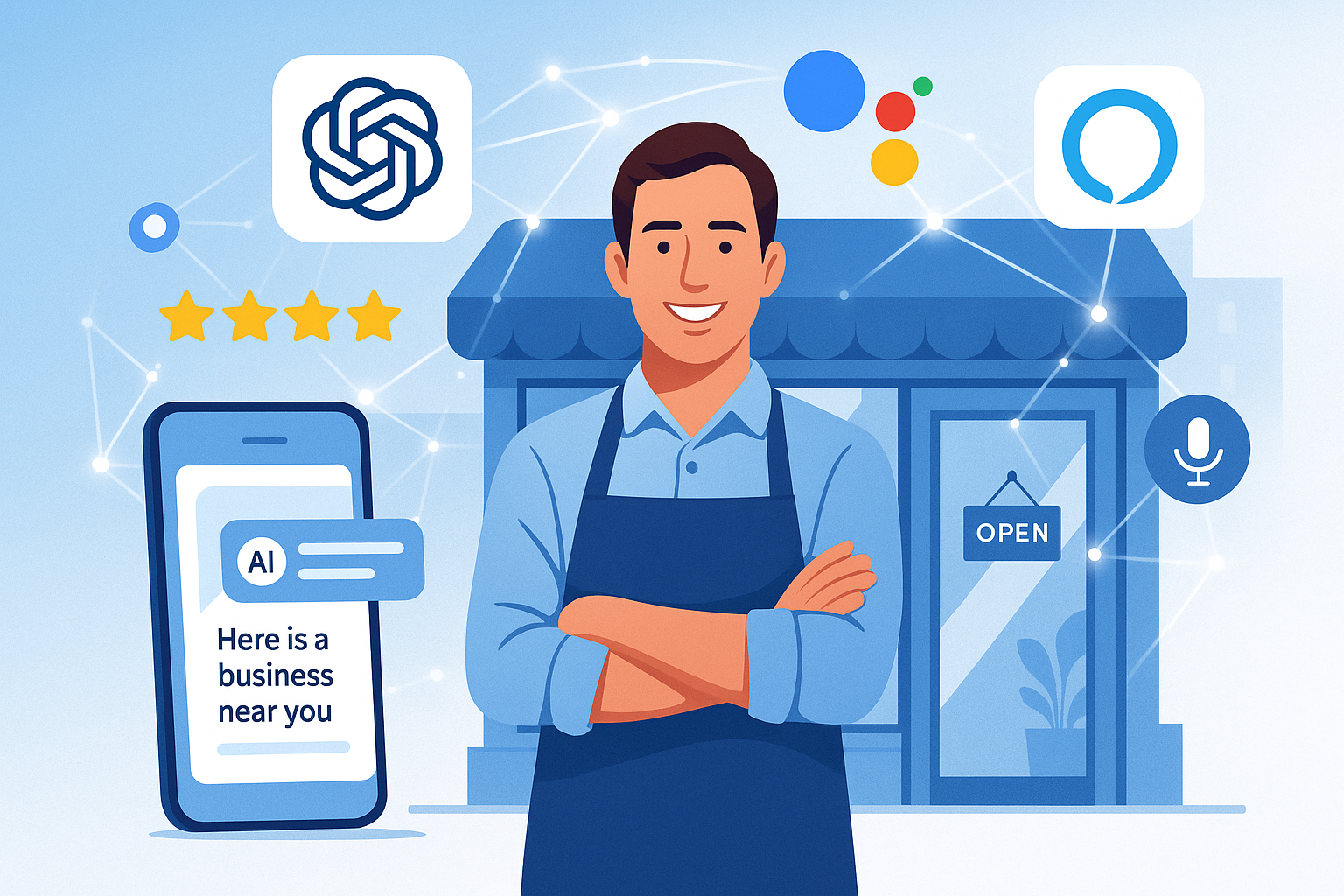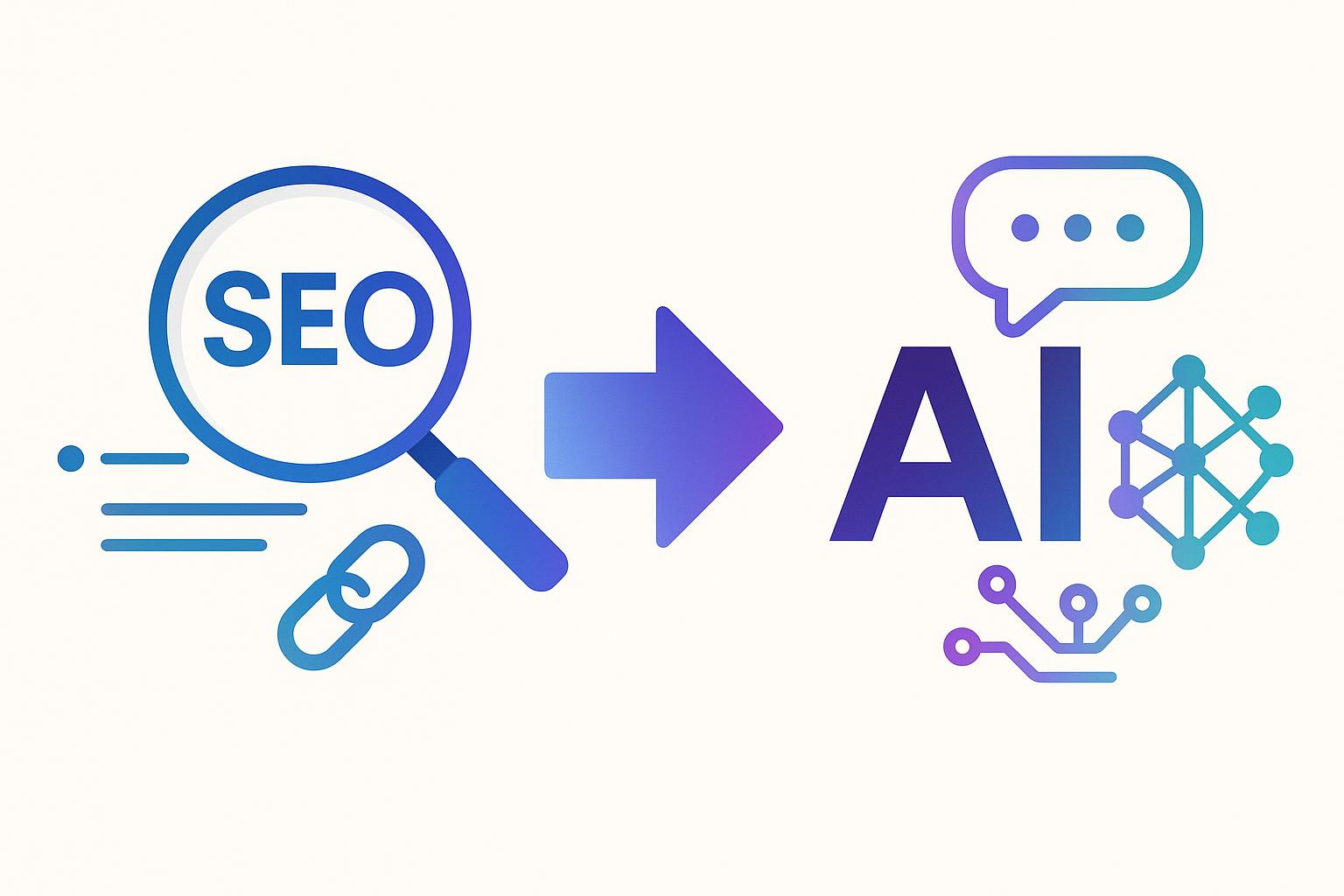How to Get Your Local Business Mentioned in AI Responses
Introduction
Imagine a tourist in Chicago asking their phone, “Where can I find the best deep-dish pizza near Millennium Park?”
In another city, a new resident wonders, “Who is a reliable HVAC contractor in Scottsdale?”
And elsewhere, a family asks their smart assistant, “What’s the best eco-friendly pest control in Austin?”
In seconds, the AI responds with a business name. Is it yours?
This scenario isn’t futuristic; it’s the new reality for all local businesses. Conversational AI and AI-powered search engines like Google’s AI Overviews, Perplexity, and ChatGPT are rapidly becoming the new front door for customers. Getting your business—whether it’s a restaurant, retail store, law firm, or home service company—mentioned in these AI responses isn’t luck; it’s the result of a deliberate and strategic approach to your online presence.
Being the AI’s trusted recommendation is the new five-star review, the new top search result, and the new word-of-mouth referral all rolled into one. This comprehensive guide will break down the essential AI SEO strategies for local businesses, providing you with an actionable blueprint for how to get your business mentioned in AI responses and win in this new era of search.
Quick Answer: How to Get Featured in AI Search
To get your local business mentioned in AI responses, you must build a strong, authoritative digital presence. This involves four key pillars:
-
Monitor Your Visibility: Track how often your brand is mentioned by AIs for key customer queries specific to your business type.
-
Structure Your Data: Meticulously optimize your Google Business Profile, use a knowledge management platform, and implement specific Schema markup on your website.
-
Create Expert Content: Develop in-depth, location-specific content that answers your customers’ most common questions and showcases your unique expertise.
-
Build Web Authority: Earn mentions and links from other reputable local websites, directories, and news sources.
Why AI Mentions Are the New Frontier for Your Business
For years, the goal was to rank #1 on Google. Today, that goal is evolving. While traditional SEO is still vital, you now have to optimize for being the answer, not just the link. When an AI like ChatGPT synthesizes information to provide a direct answer, it often bypasses the list of blue links entirely.
Here’s why this matters for your local business:
-
High-Intent Customers: Users turning to AI for recommendations are often ready to act. A query like “which local boutique sells handmade jewelry?” or “find a family law attorney near me” comes from someone looking to make a purchase or an appointment.
-
Implied Trust: An AI recommendation feels more like advice from a knowledgeable assistant than an advertisement. This perceived impartiality gives your business an instant credibility boost.
-
The Winner-Takes-Most Market: AI responses often feature only one to three businesses. If you aren’t in that elite group, you are effectively invisible for that query. This makes getting a company featured in ChatGPT or Google AI a critical competitive advantage.
How AI Models Find and Recommend Local Businesses
Before you can influence AI responses, you need to understand how they work. Large Language Models (LLMs) are not sentient; they are incredibly sophisticated pattern-recognition machines. They generate responses by synthesizing vast amounts of information they were trained on from the public internet.
When an AI needs to recommend a local business, it scours its training data for signals of quality, relevance, and trust. These signals come from:
-
Your Website: The quality, depth, and clarity of your product pages, service descriptions, menus, blog posts, and about page.
-
Structured Data: Code on your website (like Schema markup) and profiles (like Google Business Profile) that explicitly defines what your business is, what it sells or does, and where it operates.
-
Third-Party Mentions: What other websites, directories (like TripAdvisor or Avvo), news articles, forums, and review sites say about you.
-
Customer Reviews: The volume, velocity, and sentiment of reviews on platforms relevant to your industry.
Your job is to make the data about your business so clear, consistent, and authoritative that you become the most logical and reliable answer to a user’s query.
Core Strategies to Get Your Company Featured in AI Responses
Achieving visibility in AI search is not about a single magic bullet. It’s about executing a multi-faceted strategy that builds a powerful digital foundation.
1. First, Measure: Monitor and Benchmark Your AI Visibility
You can’t fix a problem you can’t see. Before you change your website, you need to know where you stand. How often is your business being mentioned by AI right now? Are your competitors showing up for key terms where you are absent?
This is where specialized tools become invaluable. Answering how to get business mentioned in AI responses starts with data.
-
Platforms like RivalSee are engineered to solve this exact problem. RivalSee acts as your AI mystery shopper, allowing you to monitor how often your brand appears in responses from ChatGPT, Google AI, Claude, and more. A key strength is its use of persona-driven conversations, which simulate how real customers search. You can track your mention rate for diverse queries—from “best brunch spot with a patio in San Diego” to “find an emergency HVAC repair in Miami”—to get a clear baseline and reveal where competitors are outperforming you.
2. Build Your Digital Foundation: The “Knowledge Graph” Approach
An AI model needs to be “fed” clean, consistent, and structured information about your business. Think of this as building a central brain or “knowledge graph” of facts about your company that AIs can easily access and trust.
Master Your Google Business Profile (GBP)
For any local business, especially when trying to rank a local business in Google AI search, your Google Business Profile is the single most important piece of digital real estate.
-
Complete Every Section: Don’t just list your name. Fill out your services and attributes with detail. For a restaurant, this means listing ‘Dine-in,’ ‘Takeout,’ ‘Outdoor Seating,’ and uploading your menu. For a law firm, it would be ‘Estate Planning’ or ‘Family Law.’ A retail store should list its product categories and brands it carries.
-
Leverage Google Posts: Regularly share updates. A restaurant could post about its weekly specials, a boutique could announce a new clothing line, and a service business can share seasonal reminders. This signals to Google that your business is active.
-
Generate and Respond to Reviews: Actively solicit reviews and respond to all of them—positive and negative. This interaction is a powerful trust signal.
To ensure absolute consistency, especially for multi-location businesses, knowledge management platforms are key. A powerful tool in this space is the Yext Answers AI product. Yext allows companies to create and manage their own “knowledge graph”—a central repository of every fact about their brand. The Yext Answers platform uses this structured information to power search on a company’s own website and, critically, syncs it across a vast network of publishers, including Google, Amazon Alexa, Apple Maps, and Yelp.
We can better understand how it influences search and AI responses by looking at its core function: it provides AI models with pre-verified, unambiguous data, removing any guesswork. You can explore the details on the Yext Answers product page to see how it organizes business data for AI consumption.
Implement Specific Schema Markup
Schema markup is code you add to your website to help search engines understand the context of your information. Use the most specific schema for your business type:
-
Type: Use
Restaurant, Store, LegalService, HVACBusiness, or PestControl instead of the generic LocalBusiness.
-
Details: Add other relevant schema like
Menu for a restaurant, Product for a retail store (including price and availability), or Service for a contractor (detailing the specific services offered).
-
FAQs: Use
FAQPage schema on your Q&A pages.
3. Create Authoritative, Niche-Specific Content
Your website needs to be the definitive resource for what you do in your local area. AIs are designed to find and favor genuine expertise.
Answer Every Potential Customer Question
Think beyond selling. Educate and inform.
-
A local bakery could write a definitive guide on ‘The Difference Between Sourdough and Whole Wheat Starters.’
-
A boutique could create a style guide on ‘How to Style a Scarf for Every Season.’
-
A law firm could explain ‘What to Expect During Your First Estate Planning Consultation.’
-
A pest control company could create a deep-dive article on eco-friendly pest control Texas, detailing specific methods and benefits.
This level of detail establishes you as the go-to expert.
Build Topical Authority with Content Hubs
Don’t just write one-off blog posts. Group your content into “hubs.” For instance, a local law firm could create a ‘First-Time Homebuyer’s Hub’ with articles on closing costs, title insurance, and property deeds. A garden center could have a “Native Plant Hub” with guides for different soil types and sunlight conditions in your region. This structure signals comprehensive expertise to AI.
4. Build a Powerful “Web Presence” Beyond Your Site
AI models learn from the entire internet. Your reputation across the web is paramount for getting a company featured in ChatGPT and other models.
Get Listed in Relevant Directories
Be present where your customers are looking. This means major directories like Yelp and the BBB, but also industry-specific ones: TripAdvisor or OpenTable for restaurants, Avvo for lawyers, Houzz for home services. The absolute key is NAP Consistency: Your Name, Address, and Phone number must be identical everywhere.
Earn High-Quality Local Backlinks and Mentions
A mention from another trusted local source is a powerful vote of confidence.
-
Partner with others: A restaurant can partner with a local food blogger for a review. An accounting firm can co-host a webinar with a local financial planner.
-
Get local press: A retail store can issue a press release when it starts carrying a popular new brand.
-
Engage with the community: Sponsoring a local charity event or a youth sports team often results in valuable mentions and links.
Putting It All Together: A Step-by-Step Action Plan
-
Audit & Monitor (Week 1): Establish a baseline. Use a platform like RivalSee to run queries that your ideal customers would use. Identify 5-10 important queries where you don’t appear. This is your initial target list.
-
Structure Your Data (Weeks 2-3): Perform a complete overhaul of your Google Business Profile. Then, work with a developer to implement the most specific schema markup for your business type on your website. If you want maximum control, investigate how the Yext Answers AI product can centralize your business facts.
-
Create Expert Content (Month 2 and Onward): Using your target query list, start writing. If AI isn’t mentioning your restaurant for “best gluten-free options,” create a detailed guide to your gluten-free menu, including cross-contamination procedures. Commit to publishing at least one piece of deeply informative, local content per month.
-
Build Local Authority (Ongoing): Dedicate a few hours each month to local outreach. Join your local business association, identify a partner for a cross-promotion, or reach out to local media.
-
Iterate and Refine (Ongoing): AI optimization is not a one-time task. Continue to monitor your AI visibility. As you publish new content and build new links, check your progress. Tools with competitor tracking, like RivalSee, are essential here, as they can show you if your efforts are successfully closing the gap.
Conclusion: Become the Answer
The shift to AI-powered search represents a fundamental change in how customers find and choose local businesses. Being the company that AI models trust and recommend is the ultimate competitive advantage, cutting through the noise to place your brand directly in front of a customer at their precise moment of need.
This isn’t achieved through shortcuts. It’s the result of meticulously building a digital presence rooted in expertise, authority, and trust. By structuring your data for clarity, creating content that demonstrates your unique expertise, and building a strong reputation across the web, you are not just optimizing for an algorithm. You are building a better, more helpful resource for your customers—and the AIs are designed to reward exactly that.
For Marketing Agencies: Offering local AI visibility services to your clients? Our guide to The Best AI Visibility Tracking Tools for Digital Marketing Agencies covers agency-specific platforms, client reporting features, and scalable monitoring solutions perfect for local business portfolios.



